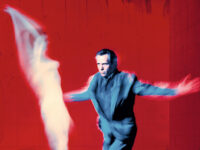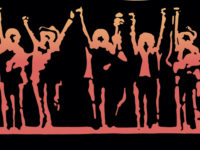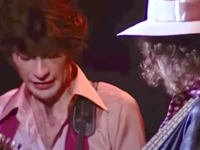Daniel Lanois had a guiding hand as producer in creating the just-right atmosphere around several signature recordings of the 1980s — including memorable efforts from U2, the Neville Brothers, Bob Dylan, Peter Gabriel and on the long-awaited initial solo offering from Robbie Robertson, ex-guitarist with the Band.
Then he put out a deeply personal, if largely forgotten, solo recording to close out the decade, and it proved to be a lost classic — if, for no other reason, than Aaron Neville’s extraordinary take on the traditional hymn “Amazing Grace.”
We’ll start with his most underrated collaboration from a little Irish band’s (initial) heyday …
U2, THE UNFORGETTABLE FIRE, (1984): Long before Daniel Lanois and co-producer Brian Eno would find multi-platinum success with The Joshua Tree — and long before all the multi-platinum babes were prattling and humming outside the every tour bus stop worldwide — U2 was still a little rough, and more than a little randy.
When they invited these two over, what followed was one of the band’s most experimental recordings, and perhaps its most uneven. No matter: In today’s over-processed market, you have to admire both the ambience and ambition in any recording captured (really) inside of a castle. No surprise, it leads to moments of shimmering brilliance — including the title track and, of course, the better-known “Pride.”
PETER GABRIEL, SO (1986): Working within a sound palette that gives him some room to stretch, Peter Gabriel actually gets within himself — avoiding the kitsch, bare-knuckle sax fills and sometimes too-jaunty pop stuff that had marred earlier efforts at updating the prog-rock framework. Radio-ready offerings like “Sledgehammer” haven’t aged as well, but this album’s enduring pleasures were always found as “Red Rain” erupts, “Don’t Give Up” tearfully overemotes, “In Your Eyes” descends from the heavens, and “That Voice Again” crashes down.
Each mines a deep well of musicality, featuring far-off tablas, Youssou N’Dour strolling up and yelping with joy, cumulus synthesizers. Yet everything feels organic: Gabriel once said he picked the album title because he “liked the shape.” With a low-key assist from Daniel Lanois, his offbeat vision was finally fully realized.
ROBBIE ROBERTSON, ROBBIE ROBERTSON (1987): Released a decade after the Band waltzed off, Robertson’s belated solo debut found him stirring up familiar ghosts. As odd as it might have once sounded, this was the perfect setting for Lanois’ patented portents.
That said, friends U2 and Gabriel make perhaps too many contributions (“Fallen Angel” could have been on So; “Sweet Fire of Love” on “Joshua Tree”). The project is saved by Robertson’s centering presence. His voice, broken and yearning, brings a crippled dignity that even those outsized guest turns can’t drown out.
THE NEVILLE BROTHERS, YELLOW MOON; and BOB DYLAN, OH MERCY (1989): Getting the Nevilles, a justly legendary live act, to make a representative recording was just about as hard as getting Dylan to, back then. But Daniel Lanois, in two master strokes, coaxed grand performances out of both.
With the Neville Brothers, it was about finding an easy truce during a shotgun marriage of voodoo funk and overt spirituality. With Bob Dylan, it was, more than anything, about commitment to the studio craft — of singing, of writing, of not blowing so hard into the harp that spit actually flies out the other side. There is a surprising R&B rabble to Oh Mercy, too, and that gives it grit.
DANIEL LANOIS, ACADIE (1989): You expected something similar in tone with his best stuff — that is to say, his most atmospheric stuff — from the previous decade. And Lanois nearly gets there during a couple of tunes that feature lightly ethereal shadings from Eno.
More often, though, “Acadie” is a song cycle of smaller ambitions. Really, it’s just a folk-rock album — by way of the Cajun prairie, of course. Imagine my surprise, after reveling in the complexity of Gabriel and U2, at how moving Lanois’ solo debut was — in its simplicity.
- How Deep Cuts on ‘Music From Big Pink’ Underscore the Band’s Triumph - July 31, 2023
- How ‘Islands’ Signaled the Sad End of the Band’s Five-Man Edition - March 15, 2022
- The Band’s ‘Christmas Must Be Tonight’ Remains an Unjustly Overlooked Holiday Classic - December 25, 2016




